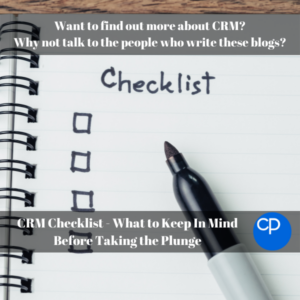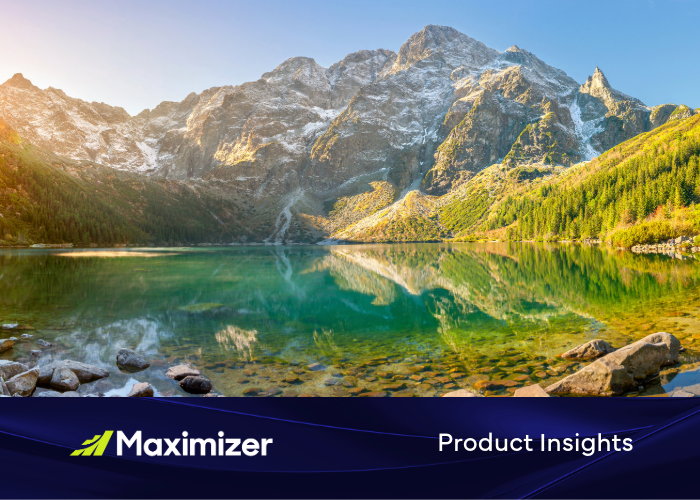 So, you’ve decided to invest in a new CRM system, and your reasons for going ahead with this purchase may be unique to your company, broader business strategy and goals. However, there are a few fundamental issues you should consider before taking the plunge. We’ve created a CRM checklist with everything that you need to keep front of mind when investing in a CRM system.
So, you’ve decided to invest in a new CRM system, and your reasons for going ahead with this purchase may be unique to your company, broader business strategy and goals. However, there are a few fundamental issues you should consider before taking the plunge. We’ve created a CRM checklist with everything that you need to keep front of mind when investing in a CRM system.
Pre-Implementation
1. Vendors
First things first, what kind of relationship do you want to have with your CRM provider? Will you require an ongoing relationship with the vendor to have access to their technical support, education, account reviews, updates, and so on? Or do you have the resources in-house to manage everything technical yourself?
Finding the right CRM vendor can make or break a system for you. We have a couple of articles that you might find useful in your search for the right vendor:
Independent CRM Consultants – What, Who & Why
Finding a CRM Partner – the perfect match
2. User Adoption
So, what’s next in this CRM checklist? Now that you’ve decided who you are going to take on externally, you need to look inside and have a think about your users.
Users are critical to any system’s success; you need to keep in mind what will work best for them. So, what can you do to reduce the risks of poor user adoption?
Where will your users be based? Depending on whether your users are mostly office-based, working from home or on the road with sporadic internet connectivity, your CRM system will be set up and accessed differently.
What is your policy on hardware? Do you offer all your employees the tools that they require, or do you encourage them to bring their own devices? For some organisations, being flexible with hardware restrictions works, while others require tighter control over what updates a user instals.
If you want to find out more about user adoption, we have some useful blogs here:
Here are 5 reasons you need a CRM Champion
Checklist for improving user adoption in CRM
3. Data
Data integrity is critical: what good is a CRM system if the data can’t be trusted, isn’t freely accessible, or isn’t relevant?
Automation is one approach to ensure data consistency – if your marketing automation software can connect to your CRM system, for example, automatically updating customer records when they interact with your website helps keep things accurate.
Whether it’s a one-time data upload or a daily/weekly data import, you should be cautious with any imported data. If your data is incorrect, you should think about employing data cleansing services.
Want to find out more about the data in your CRM system? Check out these articles:
What do you need to consider with the data in your CRM?
Managing CRM Data Integrity
Implementation
So, you’ve bought a CRM system, your users have been taught how to use it and the data is suitably clean, what now?
4. Administrators
Administrators will be required to manage any well-functioning CRM solution, depending on the size of your user population and the complexity of your database.
Your Data Administrator/s is in a position of trust and is responsible for maintaining the database clean and neat. They are the perfect person to be your CRM Champion and will be aware of the purpose of each field in your database as well as the consequences of changing or removing the values. They’ll run reports to look for records that are missing critical information or have erroneous data, among other things.
CRM systems must adapt to the changing needs of your organisation; your administrators must monitor what is possible inside the current CRM system and advise when you’ve outgrown it. Your systems will be able to grow with your usage and business needs if CRM planning remains at the centre of your business.
How to Manage Data Integrity using Maximizer CRM
Visualising Data using Maximizer CRM
Post-Implementation
Now that you have the system up and running, your admin team knows exactly what they’re doing, and the business is ready to reap the benefits of your brand-new CRM system. CRM is a journey that evolves and develops as the business adapts to internal and external changes. It’s what we call “CRM maturity.”
5. Data Quality
A single version of the truth, where everyone can see the same, accurate, and relevant customer/prospect data, is the first step toward CRM maturity. Realistically, you’ll never achieve 100 percent clean data – but where do you fall on the scale of cleanliness?
5 signs that your CRM data integrity is going down the drain
6. Data Analysis
So, your data is as clean as it can be, but what are your plans with that data?
- How do you want to analyse your reports? Management information should be used to make the best company decisions possible.
- Do you want summaries provided to you monthly or on an ad hoc basis?
- What level of detail do you want in your reports, and who will have access to it?
- What kind of reports and dashboards do your sales, marketing, and customer service teams require to assist them in making decisions and taking actions?
All these in-depth data analyses necessitate the use of the correct business intelligence tools to assist you in completing the task – and choosing the right one that meets your needs and specifications will be critical.
4 vital CRM reports for your Small Business
4 vital CRM reports for Managing Directors
There you have it, our CRM checklist, that is what you need to be thinking about before, during, and after implementing a CRM solution. If you want to find out more or are looking to start this journey yourself, get in touch and we’ll help you in any way that we can.




